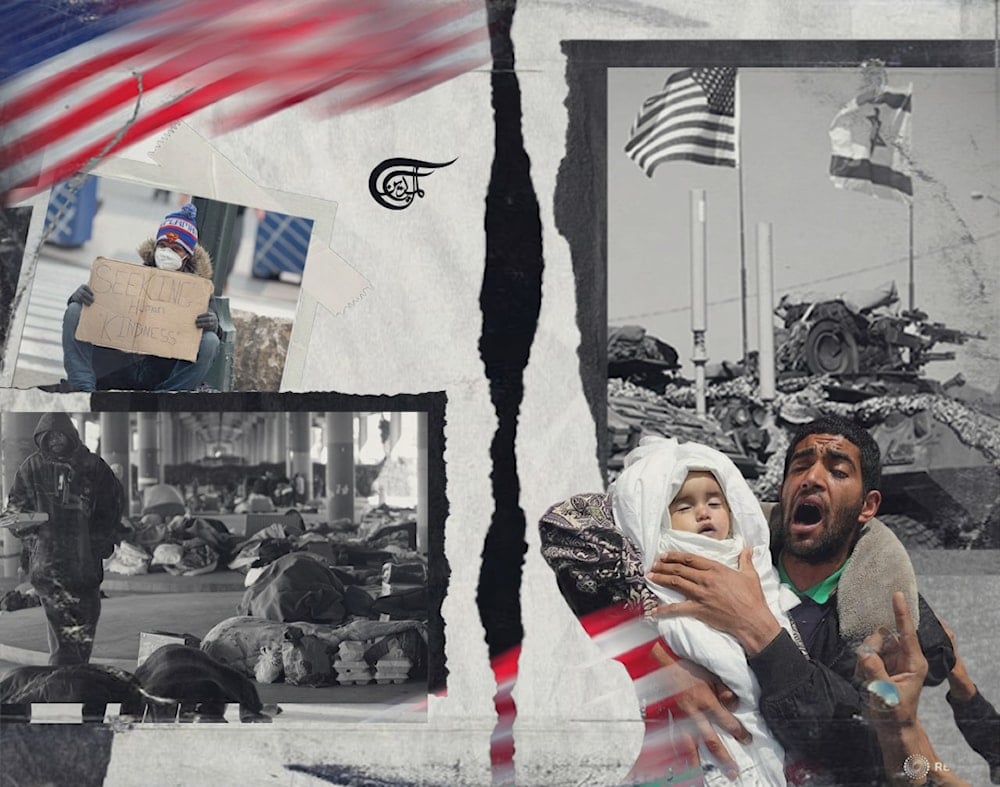Awakening to political patronization: From Palestine to domestic neglect
In our own backyard, the disconnect between public sentiment and political action isn't solely confined to global matters but resonates within domestic realms as well.
-

some politicians operate under the assumption that public awareness is easily manipulated while turning a blind eye to pressing domestic issues (Illustrated by Batoul Chamas; Al Mayadeen English)
In the complex tapestry of democratic governance, there exists an implicit trust between citizens and their elected representatives. We grant them authority to advocate for our collective welfare, to address societal ills, and to navigate the global landscape with integrity. However, recent events have laid bare a disconcerting reality: some politicians operate under the assumption that public awareness is easily manipulated while turning a blind eye to pressing domestic issues. From gun control to healthcare and homelessness, our elected officials seem deaf to the cries of their constituents, all while being beholden to special interests like AIPAC, perpetuating a cycle of corruption that undermines the very foundation of democracy.
The Israeli-Palestinian struggle serves as a glaring example of this disconnect between public sentiment and political action. Despite mounting evidence of human rights abuses and systemic oppression, many elected representatives continue to offer unwavering support to the Israeli government. This blind allegiance, fueled by lobbying efforts and financial incentives from groups like AIPAC, underscores a troubling trend of prioritizing political expediency over moral integrity.
However, the disregard for public outcry extends well beyond international affairs. In our own backyard, the disconnect between public sentiment and political action isn't solely confined to global matters but resonates within domestic realms as well. This disjunction is glaringly apparent in pressing issues, such as gun control, healthcare, and homelessness, which have reached alarming levels of crisis within our communities.
The grip of the gun lobby on politicians is multifaceted and deeply entrenched within the fabric of American politics. At the heart of this influence are extensive lobbying efforts and campaign contributions aimed at securing favorable treatment for the firearms industry and blocking any legislation perceived as a threat to its interests. The gun lobby, led by powerful organizations like the National Rifle Association (NRA), leverages its financial resources and grassroots network to sway lawmakers at both the state and federal levels.
In addition to direct financial support, the gun lobby maintains its sway through the implicit threat of political retribution. Politicians who dare to defy its agenda risk facing well-funded opposition in primary elections or negative advertising campaigns that could undermine their reelection prospects. This fear of backlash can deter even those politicians who may personally support gun control measures from taking action, as they weigh the potential consequences of crossing powerful interest groups against the demands of their constituents.
Furthermore, the gun lobby has mastered the art of shaping public discourse and framing the gun control debate in a way that benefits its agenda. By promoting narratives centered on individual rights, self-defense, and the Second Amendment, they effectively mobilize a vocal base of supporters who view any attempts at gun regulation as an infringement on their freedoms. This ideological framing not only reinforces existing political divisions but also creates a formidable barrier to enacting substantive reforms, as lawmakers hesitate to alienate a significant segment of their electorate.
As a result of these various tactics, politicians find themselves ensnared in a web of influence where the interests of the gun lobby often take precedence over the safety and well-being of the public. Despite overwhelming public support for measures like universal background checks and restrictions on high-capacity magazines, substantive action remains elusive, perpetuating a cycle of inaction and tragedy. Breaking free from this stranglehold will require a concerted effort to challenge the status quo, hold elected officials accountable, and prioritize the common good over narrow special interests.
Moreover, the issue extends beyond gun violence to encompass other critical societal challenges like healthcare and homelessness. Despite widespread recognition of the need for comprehensive healthcare reform to ensure equitable access to affordable medical services for all citizens, political gridlock and special interest influence have impeded meaningful progress. Similarly, the pervasive issue of homelessness persists unabated, despite growing public awareness and demand for proactive measures to address its root causes, such as the lack of affordable housing and inadequate support systems for vulnerable populations.
In essence, the failure of policymakers to heed the voices of their constituents and enact meaningful change reflects a broader crisis of democratic accountability and representation. The gap between public opinion and political action underscores the urgent need for a more responsive and accountable governance framework that prioritizes collective welfare over partisan interests and corporate influence. Until such systemic reforms are realized, the disconnect between public outcry and policy outcomes will persist, perpetuating the cycle of societal dysfunction and exacerbating the plight of those most in need.
Similarly, the state of healthcare in America is nothing short of a national disgrace. Millions of Americans lack access to affordable healthcare, while exorbitant medical costs force many into financial ruin. Despite repeated calls for reform, politicians continue to prioritize the interests of pharmaceutical companies and insurance lobbyists over the well-being of their constituents.
Meanwhile, the homelessness crisis has reached epidemic proportions, with tent cities springing up in major urban centers and suburban neighborhoods alike. Rather than implementing comprehensive solutions to address the root causes of homelessness, politicians offer band-aid fixes that do little to alleviate the suffering of those living on the streets.
At the heart of this political malaise lies a culture of corruption that has seeped into the halls of power. Elected representatives, seduced by the allure of campaign contributions and special interest favors, have become slaves to the very forces they were elected to challenge. This insidious cycle of corruption undermines the democratic process, eroding public trust and perpetuating a system that serves the interests of the few at the expense of the many.
It is incumbent upon us, as citizens, to demand better from our elected officials. We must hold them accountable for their actions, shining a light on their complicity in perpetuating injustice and neglect. By raising our voices and mobilizing for change, we can reclaim the promise of democracy and forge a brighter future for ourselves and generations to come. The time for complacency is over; the time for action is now.

 Mona Siam
Mona Siam
 6 Min Read
6 Min Read











